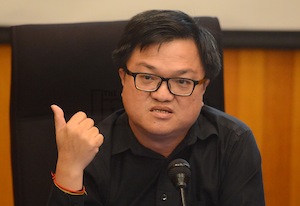The Malays’ post-NEP anxiety – Part I
Wong Chin Huat, TMI
The rise of communal exclusivism among the Malay-Muslims may not be so much because of ideational shifts than because of the deeply-rooted anxiety over the uncertainty in the post-New Economic Policy Malaysia.
And this calls for an alternative to “state partiality” as a solution to “socio-economic inequality”, a core idea in Malaya/Malaysia’s nation-building.
The inevitable rise of communal exclusivism
It’s heartening to read about a Muslim organising a “I want to touch a dog” programme for Muslims to overcome their fear of dog and, in a larger context, to bring down one of the many barriers that segregates Malaysians.
It’s heartening because otherwise what we read in the news are more often about the rise of communal exclusivism, from more restrictions demanded in the name of “sensitivity” to the outright claim that Malaysia is a “Bumi Melayu Islam” (the Land of Malay-Muslims).
(I avoid using the term “extremism”, which should be reserved for advocacy of violence.)
For many, this rise of communal exclusivism is a sad departure from a more inclusive Malaysia in earlier decades, some would say before Tun Dr Mahathir Mohamad’s reign.
I hold a crueller view. It is simply as inevitable as the collapse of Soviet Union after its tremendous success in transforming Russia into a global super power.
State partiality to overcome socio-economic inequality
Think of it this way. Malaya/Malaysia, as the main successor state of British Southeast Asia, not only had a population that was diverse in origin, faith, language and culture.
Its cultural diversity largely overlaps with socio-economic inequality – with the ethnic minorities over-represented in modern economy and education than the ethnic majority, creating reinforcing cleavages.
Such a situation poses a big challenge in decolonisation – will independence lead to the dominance of the ethnic minorities and the further marginalisation of the ethnic majority?
If so, prolonged colonisation could buy time for the backward majorities to build themselves up.
This was not only the argument raised by many Bornean leaders against the hasty Project Malaysia, for fear of dominance by Malayans and Singaporeans.
The call for Malaya’s independence was first made by the communists and leftists – including the Malays – before it was adopted by Umno and the Alliance.
One way to avoid the marginalisation of ethnic majority after decolonisation is simply denying the ethnic minorities franchise, which was basically why the Malayan Union introduced in 1946 – a multi-ethnic unitary state – was staunchly opposed by the Malays and eventually replaced by the Persekutuan Tanah Melayu in 1948 – a more ethnocratic federation.
The argument for excluding the ethnic minorities was based on their refusal to be assimilated linguistically and religiously. One may phrase the debate as one on the 1946 Question – “can the citizens be different yet equal?” and see its centrality in Malaya/Malaysia’s political history.
The communist insurgency broke out in 1948 however denied the British and the Malay elite the luxury of delaying decolonisation.
The pragmatic solution was “state partiality” in favour of the Malays as a response to their collective disadvantage in “social inequality”.
The Malays were given constitutionally enshrined “special status” in exchange of citizenship and economic freedom for the non-Malays.
The non-Malays were given qualified religious and linguistic freedom – they can practise their faiths but any conversion has to be one-way street in favour of Islam, and they can keep their mother-tongue schools but these schools are to be gradually phased out through purposeful marginalisation and negligence.
This was the so-called Merdeka Compromise – minimum disruption to the status quo to satisfy everyone with a gradualist soft assimilation goal to pacify the Malay nationalists.


